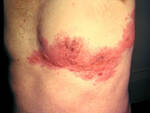Twin Pregnancies Associated with Greater Risk of Maternal Heart Disease in First Year After Births
Heart Attacks in omen: The Overlooked Warning Signs
- Pain radiating to the jaw, neck, back, stomach, or arms.
- Nausea, dizziness, or feeling faint.
COVID: Long Term Increased Risk of Heart Disease Associated with ABO Blood Type
Advancements in Cardiac Procedures Highlight Ever-Evolving Treatment Options
While a traditional open surgical approach may be better depending on the case, robotic surgery presents an array of advantages...
Lerodalcibep in Patients With or at High Risk of Cardiovascular Disease
Remote Patient Monitoring for Effective Heart Disease Management
Brigham Researchers Developing Novel Glycan Marker to Predict Cardiovascular Disease
- Vascular ring definition
- Causes and symptoms
- How the treatment of vascular ring works
What Is Vascular Ring?
Vascular ring is a heart defect that’s present from birth. A part of the body’s main artery forms a small ring around the trachea (windpipe) or esophagus (the pipe that connects the throat to the stomach). In some cases, the ring can occur around both the trachea and the esophagus, but this is less common. Compared with other congenital heart defects, vascular ring is one of the rare ones. As of today, vascular rings are incredibly rare and occur in less than 1% of babies. (more…)Multiple Gut Bacteria Associated with Atherosclerosis
There seems to be a clear association of certain gut species with atherosclerosis, but more studies are needed to determine...
Not All Patients with Coronary Artery Disease Require High Intensity Statins
ACC23: Encouraging Findings on Mortality After Acute Heart Attack
(more…)
Heart Failure: Marriage Has a Beneficial Effect For One Gender
MedicalResearch.com Interview with: [caption id="attachment_60090" align="alignleft" width="200"] Dr. Leyba[/caption] Katarina Leyba, MBA, MD University of Colorado School of Medicine MedicalResearch.com: What is the background...
Inflation Reduction Act: Implications on Out-Of-Pocket Costs for Patients with Heart Disease Risk Factors
U Michigan Study Finds Biomarkers Can Predict Myocarditis from Immune Checkpoint Inhibitors
Personalized Micronutrients May Benefit Cardiovascular Health
Herpes Zoster: Persistent Increased Risk of Cardiac Event or Stroke After Shingles
USPSTF Evaluates Statin Use for Primary Prevention of Heart Disease
NEJM: Study Compares PCI to Medical Therapy to Reduce Death or Hospitalization from Heart Failure
Premature Menopause May Increase Risk of Heart Failure and AFib
MedicalResearch.com Interview with: Jean Shin Department of Family Medicine Korea University College of Medicine Seoul,Republic of Korea
MedicalResearch.com: What is the background for this study?
Response: Younger age at menopause is a possible risk factor for cardiovascular diseases. However, data on the association among premature menopause, age at menopause, and the risk of heart failure and atrial fibrillation are lacking. We aimed to examine the association of premature menopause and age at menopause with the risk of heart failure and atrial fibrillation. (more…)
Not All Patients with Heart Failure Benefit from Salt Restriction
Coronary Artery Disease: Women Have Worse Outcomes Following Both Medical and Invasive Treatments
COSMOS: First Large Trial of Cocoa Supplement For Heart Disease and Cancer Prevention
NEJM Study Evaluates Levels of hs Troponin after Cardiac Surgery and Risk of Death
USPSTF: Screening for Atrial Fibrillation in Adults over 50
Study Finds Risk of MI Best Captured By Number of Apolipoprotein B Lipoproteins
Portable Device Screens for MicroRNAs to Rapidly Detect Heart Attack
AHA Scientific Statement Highlights Link Between Obstructive Sleep Apnea and Heart Disease
Heart Disease Biomarkers, Including Lipoprotein(a) Elevated in Psoriasis
Low Bone Mineral Density Linked to Heart Disease in Women
- 1
- 2





























